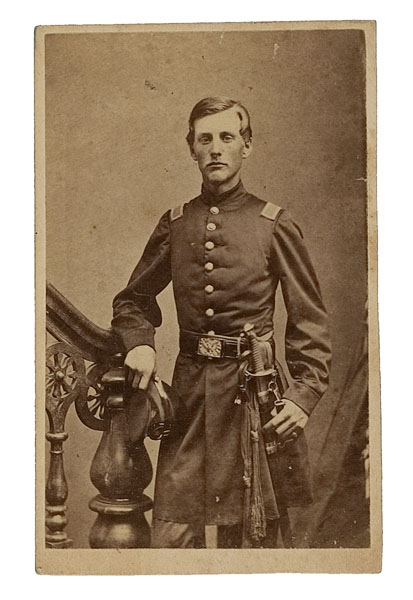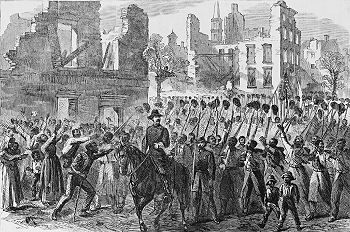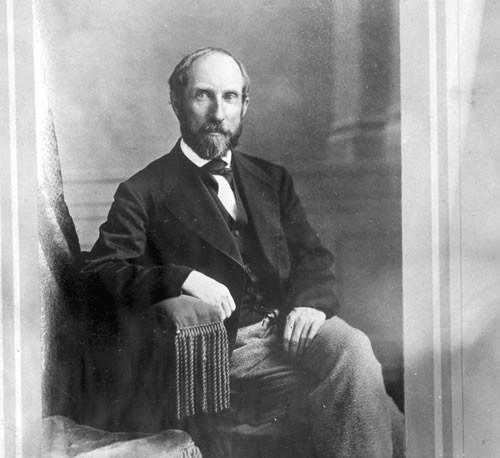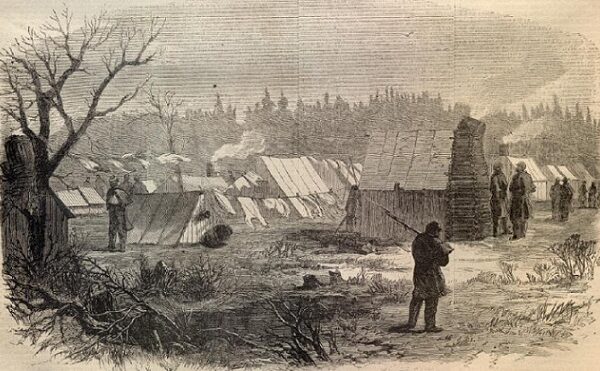
In the Voices section of our Spring 2023 issue we highlighted quotes about the onset of battle fatigue among soldiers in the Union and Confederate armies. Unfortunately, we didn’t have room to include all that we found. Below are those that just missed the cut.
“The men, totally exhausted, lay heedless to the shower of shot and shell that passed over their heads. In this position we passed the night.”
—Lieutenant Colonel Adolph Engelmann, 43rd Illinois Infantry, in his official report of the fighting at Shiloh on April 6, 1862
“I am about used up today. My shoulders and legs are lame and my feet very sore. Never since I enlisted have I been so discouraged as I am today. Here we are marching from one end of Virginia to the other, wearing ourselves out and yet nothing seems to be accomplished by it. I am willing to march and fight, but this everlasting advancing and retreating I am sick of.
My God! Hasten the end of this accursed war….” —Ernest Waitt, 19th Massachusetts Infantry, in his diary, December 3, 1863
“[I am] so completely worn out that I can’t tell how many days the[re] has been in the last two weeks … five days … I went without sleeping or eating.”
—Vermont soldier E.W. Robie, on his condition in the wake of the Seven Days Battles, in a letter to a friend, July 12, 1862
“Though I had only 6 men to work each gun, and worn-out by the previous day’s work, they fought well and with desperation for about thirty minutes, when they began to fall of exhaustion at their posts.”
—Mississippi artillery commander Putnam Darden, in his official report on the Battle of Shiloh, April 10, 1862
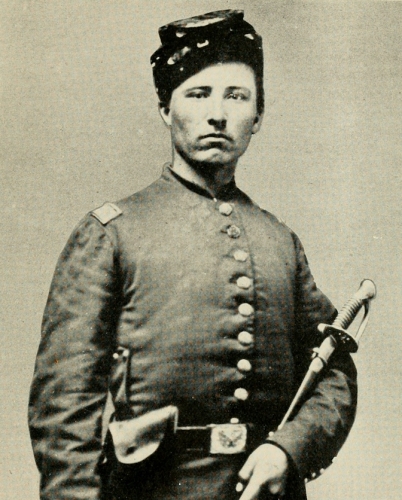
Oscar L. Jackson, 63rd Ohio Infantry
“The ten days following the 27th of May were very hard on us; sleeping without tents; our trunks kept in the rear; nothing to eat but what we carried in our haversacks and the haversacks supplied with pork and crackers only. The fight of the 28th was a sharp affair, then the digging of trenches was followed by exhausting marches. I record it as the hardest ten days’ work I ever did.”
—Oscar L. Jackson, 63rd Ohio Infantry, on the recently ended Union siege and capture of Corinth, Mississippi, in his diary, June 3, 1862
“[T]he troops were literally worn out with the excessive duty put upon them. Six weeks were consumed in passing over the thirty miles between Pittsburg Landing and Corinth.
At every advance, earthworks, strong enough for permanent fortifications, were thrown up, with abattis in front…. By the casualties of the battle, the exposure, and labor during the siege, a company of ninety men, who left Illinois less than a year before, was reduced to twenty-three effectives, and this proportion probably existed throughout the army.”
—Illinois soldier Fenwick Hedley, on the siege of Corinth, Mississippi, in his memoir of the war
“I eagerly take the first breathing moment to drop you a single line, to let you know that after all our fatiguing marches and hard fighting I am still preserved for more service…. We have had unparalleled hard work, marches daily of twenty to thirty miles, and are all pretty well worn out…. Since the battle we have been marching day and night, —last night’s was about the first sleep I have had for a week.
Worse yet, it has rained incessantly, and I have hardly known what it was to be dry.”
—William Wheeler, 13th New York Battery, on the days since the Battle of Gettysburg, in a letter home, July 9, 1863
“We are all of us completely worn out, both in body and mind. We have now been over 37 days marching and fighting.”
—Massachusetts officer Stephen M. Weld, in a letter to his father during the Overland Campaign, June 9, 1864

Edwin Forbes’ illustration of an exhausted Union soldier, titled “Played Out.”
“This campaign is coming down to a question of muscle and nerve. It is the 62d day for us, over 50 of which we have passed under fire. I don’t know anything more exhausting.”
—Illinois officer Charles Wright Wills, on the campaign for Atlanta, in his diary, July 1, 1864
“The dread reality of war was before us in this frightful death, upon the cold, hard stones. The mortal suffering, the fruitless struggle to send a parting message to the far-off home, and the final release by death, all enacted in the darkness, were felt even more deeply than if the scene had been relieved by the light of day.
After a long interval of this horror, our stretcher bearers came, and the poor suffering heroes were carried back to houses and barns. At last word came that General Sumner’s troops were marching up the mountain to relieve us. How glad we were to hear it, they only can know who have experienced the feeling of prostration produced by such scenes and surroundings, after the excitement of a bloody battle. It was after midnight, and it seemed to us bitterly cold.”
—Rufus Dawes, 6th Wisconsin Infantry, on the Battle of South Mountain, in his memoir of the war
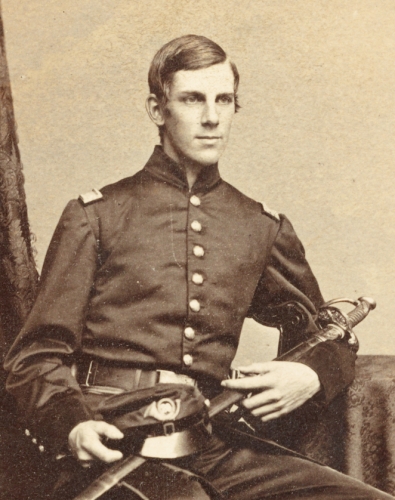
Oliver Wendell Holmes Jr., 20th Massachusetts Infantry
“I can do a disagreeable thing or face a great danger coolly enough when I know it is a duty—but … now I honestly think the duty of fighting has ceased for me—ceased because I have laboriously and with much suffering of mind and body earned the right … to decide for myself how I can best do my duty to myself, to the country, and, if you choose, to God.”
—Oliver Wendell Holmes Jr., 20th Massachusetts Infantry, in a letter to his mother about his decision to leave the army, June 24, 1864. He had been wounded in battle three times.
“[W[hen the firing ceased, I was unaware of the strain and excitement I had been under, until we were ordered to move, when I found that I was in a tremble all over.” —Charles Fuller, 61st New York Infantry, on his experience at the Battle of Seven Pines, in his personal recollections of the war “[T]he Yankey shell us evey nite [They] thro thar shls from 5 to 6 miles We go in the gun proof thar shootin … the solgers her is giten tired of the war they say thay cant stand ite much lounger.”
—Confederate soldier John Putnam, on the fighting for Petersburg, Virginia, in his diary, October 16, 1864
“At length the dreadful six-mile double-quick march was over, and the firing line was right in front of us. Some few—very few—had dropped out exhausted. All of us were nearly spent with the heat and the dust and the killing pace; and a brief halt was made to get breath, moisten our lips from the canteens, and prepare for the charge.”
—Confederate soldier Randolph H. McKim, on the First Battle of Bull Run, in his memoir of the war
Sources
OR, Series 1, Vol. 10, part 1; History of the Nineteenth Regiment, Massachusetts Volunteer Infantry (1906); Bell I. Wiley, The Life of Billy Yank (1952); The Colonel’s Diary (1922); Marching Through Georgia (1887); Letters of William Wheeler of the Class of 1855 (1875); War Diary and Letters of Stephen Minot Weld, 1861–1865 (1912); Army Life of an Illinois Soldier (1906); Service with the Sixth Wisconsin Volunteers (1890); Touched With Fire: Civil War Letters and Diary of Oliver Wendell Holmes Jr. (2000); Personal Recollections of the War of 1861 (1906); Eric T. Dean, Shook Over Hell (1997); A Soldier’s Recollections (1911).

